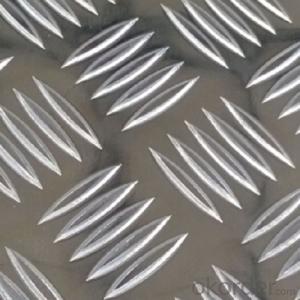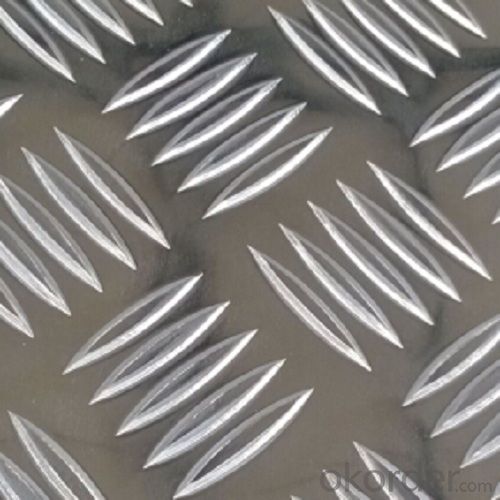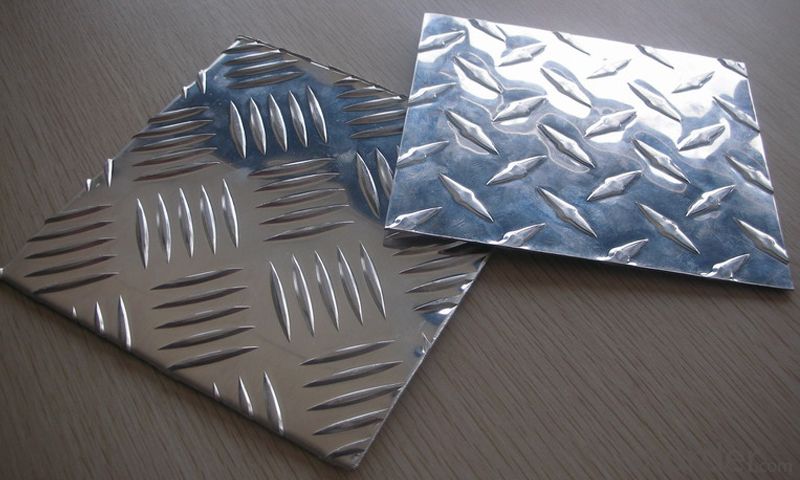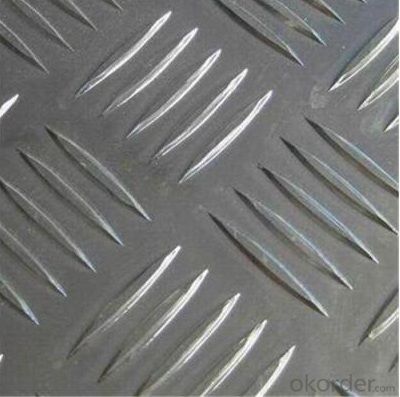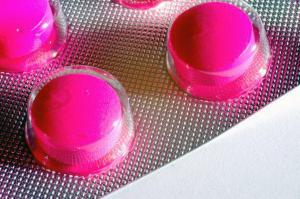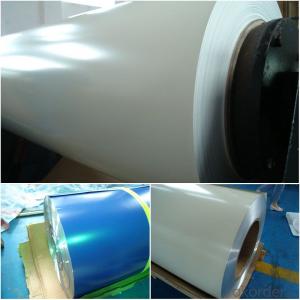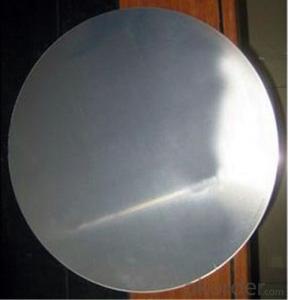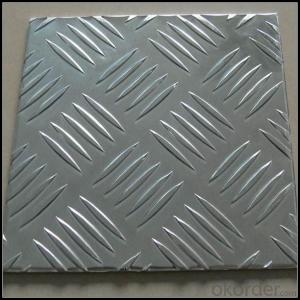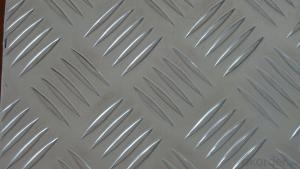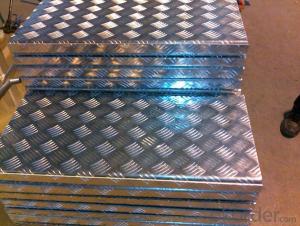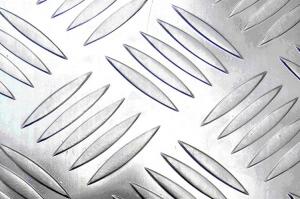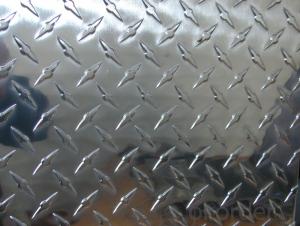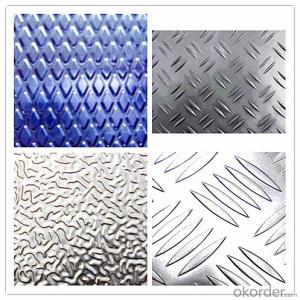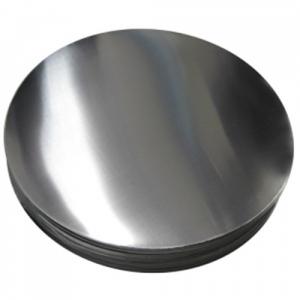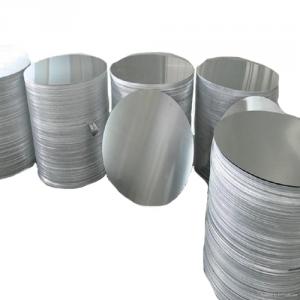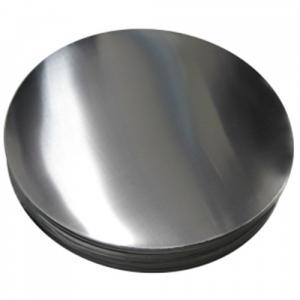Aluminum 5 Bar Treadplate for Stairs and Flooring
- Loading Port:
- Shanghai
- Payment Terms:
- TT OR LC
- Min Order Qty:
- 5 m.t.
- Supply Capability:
- 5000 m.t./month
OKorder Service Pledge
OKorder Financial Service
You Might Also Like
l Product Introduction
[1] Name: Aluminium Treadplate 5 Bar for Stairs and Flooring
[2] Alloy: 1050/1060/1100/3003/3105/5052/5083/6061
[3] Thickness: 1.0-6.0mm
[4] Width: 600mm-1500mm
[5] Length: As required
[6] MOQ: 5MT
[7] Features: Anti-skid
[8] Application: Construciton, vehicles, upholstery ceiling and etc
[9] Weight: The actual wieght be controlled within +/-10%.
[10] Package: Wooden sea-worthy pallet.
l Packaging & Delivery
Packaging detail: Seaworthy Export Standard Wooden Pallet
Delivery detail: About 25-35days
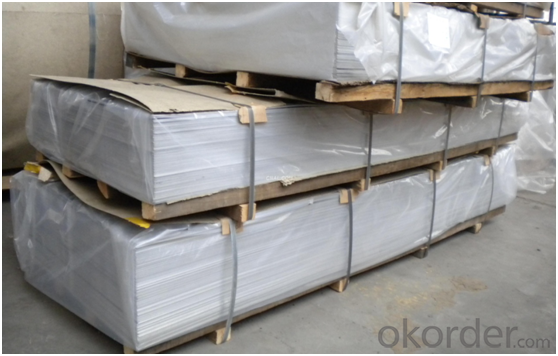
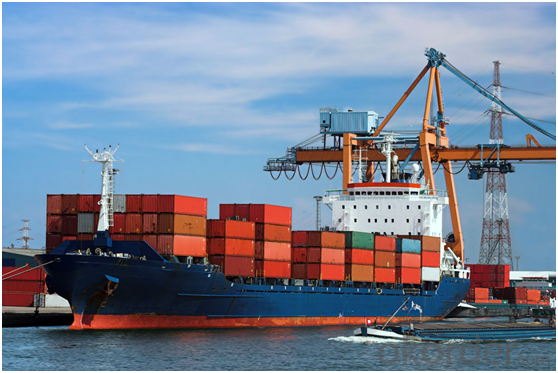
l Company Profile
CNBM International Corporation, China National Building Materials (Group) Corporation, is one of the largest companies in China building material & equipment industry, with 42,800 employees and sales in 2005 of US Dollar 4.395 billion. In 2006, China National Building Material Company Limited was listed on Hong Kong Stock Market with the stock code as 3323.
The business scope of CNBM covers from manufacturing and sales of a series of building materials to scientific research and design, import and export trade. In many of these fields, CNBM is playing the leading role.
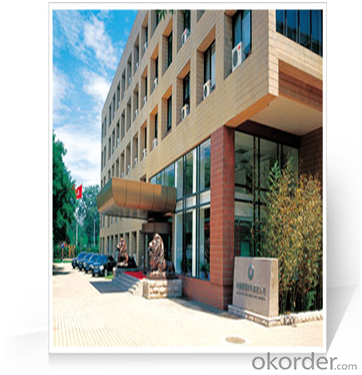
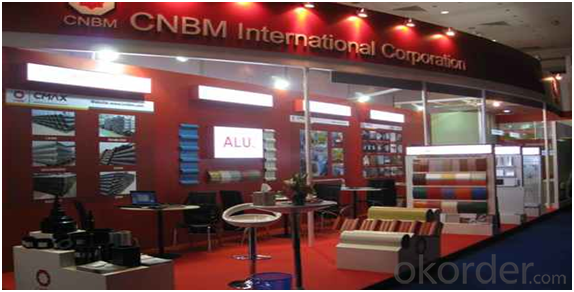
l CNBM World Wide
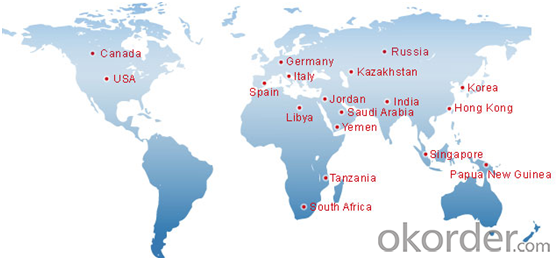
l Product Images of 5 Bar Aluminum Treadplate
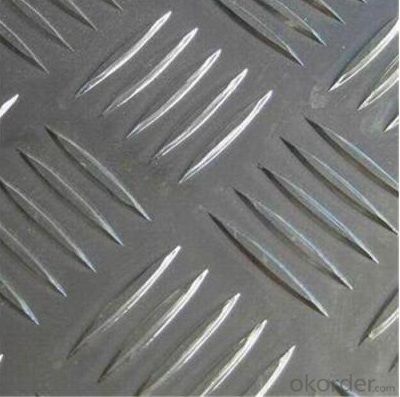
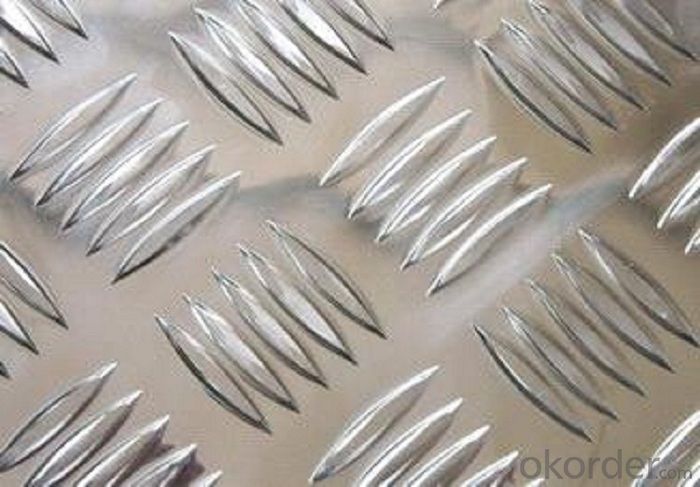
l Certificates
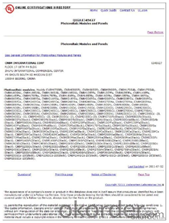
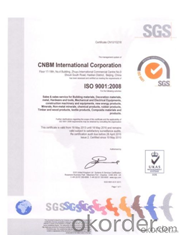
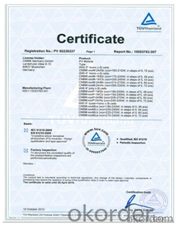
l FAQ
Q: Do you provide free samples?
A: Yes, free samples will be sent to you on freight at destination.
Q: Can I get your latest products catalogue?
A: Yes, it will be sent to you in no time.
Q: What is the MOQ?
A: 5 tons
Q: What are your payment terms?
A: We accept L/C, T/T.
l Contact Us
Email:service@okorder.com
- Q: Is aluminum a suitable material for use in electronic equipment?
- <p>Yes, aluminum is widely used in electronic equipment due to its excellent electrical conductivity, lightweight nature, and high thermal conductivity. It is commonly used in heat sinks, cases, and connectors. However, it is not as conductive as copper, so it is often used in applications where its other properties are more critical. Additionally, aluminum's corrosion resistance makes it a durable choice for various electronic components.</p>
- Q: What other materials can be used as substitutes for aluminum in various applications?
- <p>Alternative materials to aluminum include magnesium, which is lighter and often used in automotive and aerospace applications; titanium, known for its strength and corrosion resistance, though more expensive; copper, utilized for its excellent electrical conductivity; and steel, which is stronger and more durable but heavier. Additionally, composite materials like carbon fiber and fiberglass offer weight savings and high strength, though they can be more complex to manufacture. Each alternative has its own set of advantages and disadvantages depending on the specific application and requirements.</p>
- Q: Can reusing old aluminum foil be utilized for cleaning tasks in kitchen or bathroom areas?
- <p>Yes, old aluminum foil can be used for cleaning purposes in a kitchen or bathroom. It's particularly effective for scrubbing pots and pans, removing burnt-on food, and cleaning glass and tiles. The shiny side of the foil can be used to remove scuff marks from floors and the dull side can be used to scrub away stubborn stains. However, it's important to avoid using foil that has been in contact with acidic or corrosive substances, as it may have become damaged or weakened, and could potentially scratch surfaces. Always test on a small, inconspicuous area first to ensure it doesn't damage the surface you're cleaning.</p>
- Q: What are some typical combinations of metals that are used to create aluminum alloys?
- <p>Common alloys used for aluminum include 1000 series, which are nearly pure aluminum. The 2000 series, which contains copper, is known for its strength. The 3000 series, with manganese, is good for its formability. The 5000 series, which contains magnesium, offers good strength and welding characteristics. The 6000 series, which includes silicon and magnesium, is known for its strength and resistance to corrosion. Lastly, the 7000 series, which contains zinc, is the strongest and most commonly used for structural applications. These alloys are chosen for their specific properties such as strength, corrosion resistance, and workability, depending on the application.</p>
- Q: This question asks for the various applications or purposes of aluminum alloys.
- <p>Aluminum alloys are used in a wide range of applications due to their lightweight, high strength, and corrosion resistance. They are commonly used in the automotive industry for vehicle construction to reduce weight and improve fuel efficiency. In the aerospace industry, they are essential for constructing aircraft and spacecraft. Other applications include construction materials, such as window frames and roofing, and in consumer goods like beverage cans and electronic devices. Aluminum alloys are also utilized in machinery and transportation equipment, sports equipment, and various engineering components where a combination of strength, durability, and low weight is required.</p>
- Q: This question asks about the impact of adding tin to aluminum alloys on their characteristics and longevity.
- <p>Adding tin to aluminum alloys can significantly alter their properties and durability. Tin enhances the alloy's strength, hardness, and resistance to wear, making it suitable for applications requiring high mechanical properties. It also improves the alloy's corrosion resistance, particularly in marine environments. However, the addition of tin can reduce the alloy's ductility and formability, which might limit its use in certain applications that require extensive shaping or bending. The overall durability of the alloy is improved due to the increased resistance to environmental factors, but it's essential to balance the alloy composition to optimize its properties for specific applications.</p>
- Q: What are the typical applications for aluminum sheet metal?
- <p>Aluminum sheets are versatile and have numerous applications due to their lightweight, corrosion resistance, and strength. Some common uses include construction for roofing and siding, automotive parts such as body panels and heat sinks, packaging for food and beverages, aerospace for aircraft components, and in the manufacturing of electronic devices due to its good thermal conductivity. They are also used in signage, furniture, and various decorative applications.</p>
- Q: Is it possible to utilize aluminum in the creation of innovative tools and equipment?
- <p>Yes, aluminum can be used to make new types of tools and equipment. It is a lightweight, durable, and corrosion-resistant metal, making it ideal for various applications. Aluminum's high strength-to-weight ratio and ease of machinability allow it to be used in the manufacturing of tools, machinery parts, and equipment across industries such as automotive, aerospace, and construction. Additionally, its recyclability and abundance make it an environmentally friendly choice for new tool and equipment designs.</p>
- Q: This question asks about the various applications of aluminum alloys in the automotive industry.
- <p>Aluminum alloys are extensively used in automobiles for their lightweight properties and high strength. They are commonly found in engine components, such as cylinder blocks and heads, to reduce weight and improve fuel efficiency. Aluminum alloys are also used in body panels, wheels, and suspension systems to decrease the overall vehicle weight, enhancing performance and reducing emissions. Furthermore, they are utilized in heat exchangers, such as radiators, and various interior components due to their corrosion resistance and durability. The use of aluminum alloys in vehicles contributes to better fuel economy, improved handling, and reduced environmental impact.</p>
- Q: This question asks for a comparison between aluminum and magnesium, two common metallic elements, highlighting their differences.
- <p>Aluminum and magnesium are both lightweight metals with distinct properties. Aluminum is more abundant in the Earth's crust and is known for its high strength-to-weight ratio, making it ideal for construction and transportation. It is also a good conductor of heat and electricity. Magnesium, while also lightweight, is less dense and has a lower melting point than aluminum. It is highly reactive and is often used in alloys to increase strength and durability. Magnesium is also essential for biological processes and is commonly found in supplements. In terms of reactivity, magnesium is more reactive than aluminum, which makes it more prone to corrosion in certain environments.</p>
Send your message to us
Aluminum 5 Bar Treadplate for Stairs and Flooring
- Loading Port:
- Shanghai
- Payment Terms:
- TT OR LC
- Min Order Qty:
- 5 m.t.
- Supply Capability:
- 5000 m.t./month
OKorder Service Pledge
OKorder Financial Service
Similar products
Hot products
Hot Searches
Related keywords
